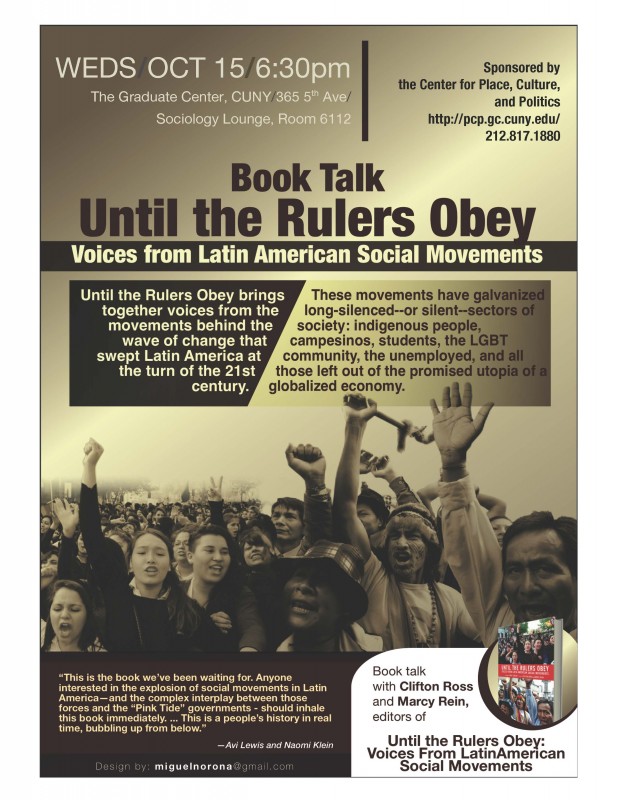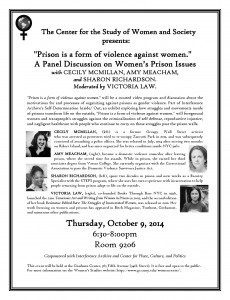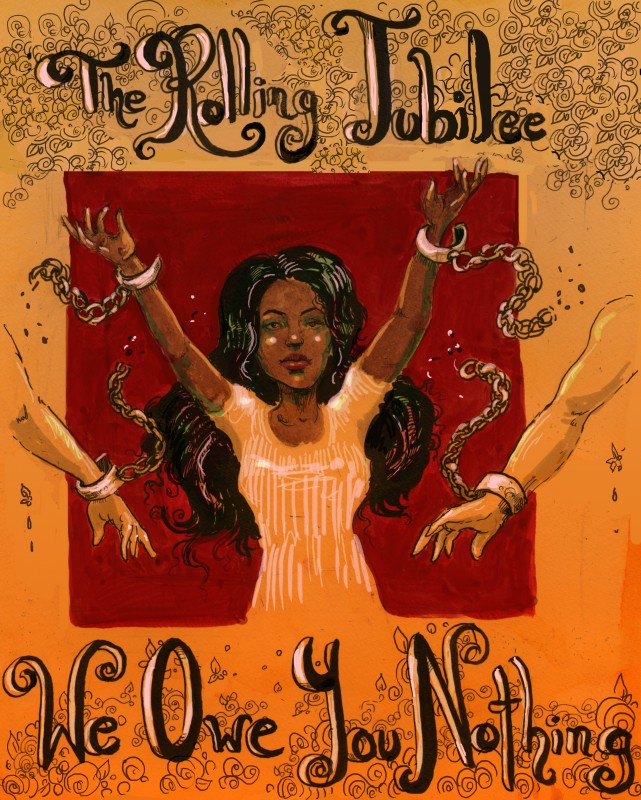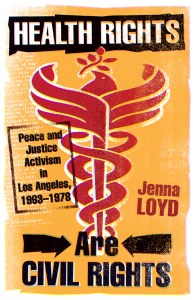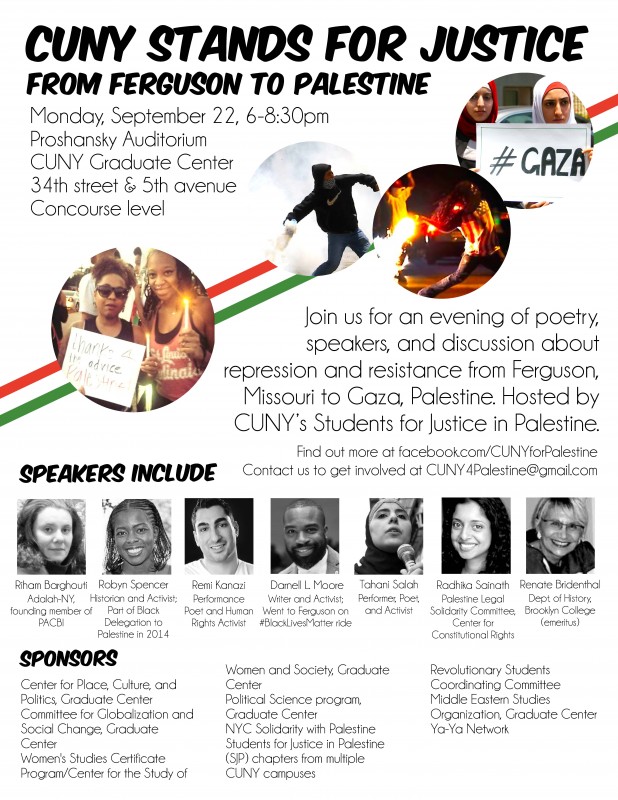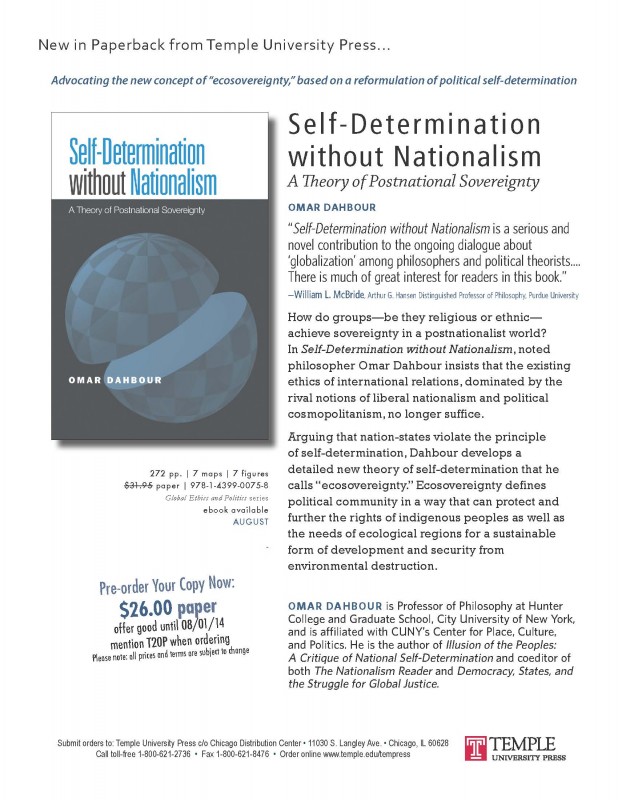After Gezi, After the Elections, After ISIS: Politics in Turkey Now
10/20/2014
6:30 pm - 8:30 pm
Room 9206/9207
After Gezi, After the Elections, After ISIS: Politics in Turkey Now
This panel will present a conversation about the current political context in Turkey, in the wake of popular protests (Gezi and its follow-ups), parliamentary and presidential elections (which have strengthened the hand of the ruling AK Party), and regional politics (particularly the horror of Syria and the rise of ISIS).
Panelists:
Burcu Baykurt is a PhD candidate in Communications at Columbia University’s Graduate School of Journalism, where she studies how technological change is affecting cultures of policymaking, journalism, and politics. She has written about and worked with citizen journalist networks in Turkey such as 140journos.
Ayça Çubukçu is Assistant Professor in Human Rights at the London School of Economics and Political Science. Previously, she taught for the Committee on Global Thought at Columbia University and the Committee on Degrees in Social Studies at Harvard University, and is currently a Visiting Scholar at the Committee on Globalization and Social Change at The Graduate Center. She is Co-Editor of Jadaliyya’s Turkey Page.
Aslı Iğsızis Assistant Professor of Middle Eastern and Islamic Studies at New York University. Her teaching and research interests include cultural representation and cultural history, narratives of war and displacement, and dynamics of heterogeneity in late Ottoman and contemporary Turkish contexts.
Duygu Parmaksizoglu is a PhD candidate in the anthropology department at The Graduate Center. She recently conducted a year-long field study of urban redevelopment/gentrification in Istanbul. While doing research, she actively participated in the Gezi demonstrations of June 2013, and in the aftermath, she served as one of the spokespersons of the Urban Movements Istanbul Organization.
Cihan Tekay is a PhD candidate in Cultural Anthropology at The Graduate Center. Her research interests include gender and the labor movement, secularism and nationalism within the left, and the history of social movements in Turkey. She has been active in various social movements in the US and in Turkey, including antiracist, feminist, ecological, anticapitalist, and international solidarity work. She is a contributor to the Turkish daily Radikal and to Mashallah News, and is Co-Editor of Jadaliyya’s Turkey Page.
Emrah Yildiz is a Joint PhD Candidate in Social Anthropology and Middle Eastern Studies at Harvard University. His research interests include historiography and ethnography of borderlands, anthropology of Islam and pilgrimage, political economy and contraband commerce, as well as studies of gender and sexuality in the Middle East. He is Co-Editor of Jadaliyya’s Turkey Page, and co-editor of the collection “Resistance Everywhere”: The Gezi Protests and Dissident Visions of Turkey.
The event is co-sponsored by the Center for Place, Culture and Politics.
This event is open and free to the public.
Book Talk: Until the Rulers Obey
10/15/2014
6:30 pm - 8:30 pm
Room 6112
Please join Clifton Ross and Marcy Rein in a discussion of their book Until the Rulers Obey.
Wednesday, October 15, 6:30-8:30 PM
Room 6112 (sociology lounge)
Graduate Center, CUNY
Until the Rulers Obey brings together voices from the movements behind the wave of change that swept Latin America at the turn of the 21st century. These movements have galvanized long-silent—or silenced—sectors of society: indigenous people, campesinos, students, the LGBT community, the unemployed, and all those left out of the promised utopia of a globalized economy. Editors Clifton Ross and Marcy Rein will talk about some of the key lessons these movements have to offer—lessons in strategic relations with the state, and in the creation of alternative spaces—and probe some questions their book raises: Social movements clash with progressive governments across the region over resource extraction. What does this mean politically? With whom, and how, do we practice “solidarity” in the present context? What lessons from our Latin American counterparts can we apply to our work of social transformation in the United States?
This event is sponsored by the Center for Place, Culture and Politics
“Prison is a form of violence against women”
10/09/2014
6:30 pm - 8:00 pm
9206
The Center for the Study of Women and Society
presents:
A Panel Discussion on Women’s Prison Issues
With CECILY MCMILLAN, AMY MEACHAM,
and SHARON RICHARDSON.
Moderated by VICTORIA LAW.
The event will be a curated video program and discussion about the motivations for and processes of organizing against prisons as gender violence.
Please join us on October 9, 6:30-8:00 p.m.
Room 9206, Graduate Center, CUNY
Co-sponsored with Interference Archive and Center for Place, Culture, and Politics
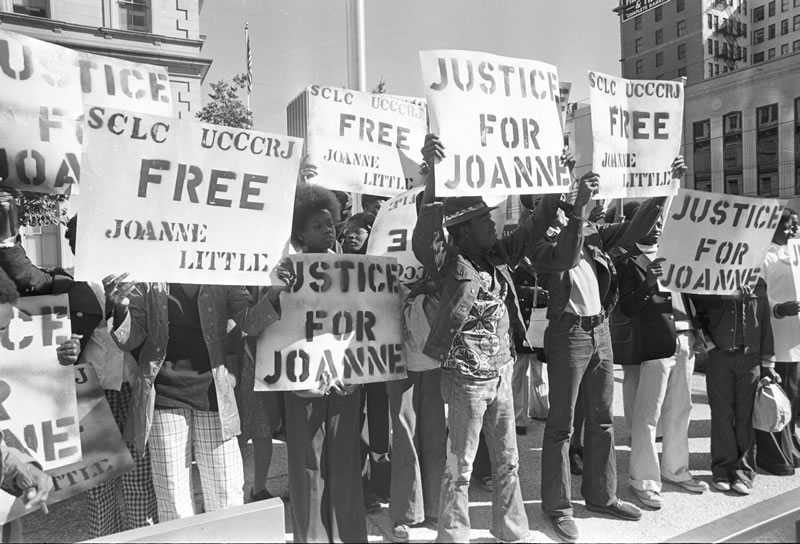 This event is free and open to the public.
This event is free and open to the public.
The Case for Debt Refusal, Andrew Ross in discussion with Ruth Wilson Gilmore, Peter Hitchcock and David Harvey
09/30/2014
6:30 pm - 8:30 pm
Martin E. Segal Theatre
Please join Andrew Ross in discussion with the Center for Place, Culture and Politics’ own Ruth Wilson Gilmore, Peter Hitchcock, and David Harvey on ‘The Case for Debt Refusal’
Tuesday, September 30 6:30-8:30 PM
Segal Theater, Graduate Center CUNY
—David Graeber, author of Debt: The First 5,000 Years
“I use Mastercard to pay Visa.” —bumper sticker
About the Book
|
Creditocracy (n.) |
1. governance or the holding of power in the interests of a creditor class2. a society where access to vital needs is financed through debt |
“It seems like pretty much everybody – homeowners, students, those who are ill and without health insurance, and, of course, credit card holders – is up to their neck in debt that can never be repaid. 77% of US households are seriously indebted and one in seven Americans has been pursued by debt collectors. The major banks are bigger and more profitable than before the 2008 crash, and legislators are all but powerless to bring them to heel.
In this forceful, eye-opening survey, Andrew Ross contends that we are in the cruel grip of a creditocracy – where the finance industry commandeers our elected governments and where the citizenry have to take out loans to meet their basic needs. The implications of mass indebtedness for any democracy are profound, and history shows that whenever a creditor class becomes as powerful as Wall Street, the result has been debt bondage for the bulk of the population.
Following in the ancient tradition of the jubilee, activists have had some success in repudiating the debts of developing countries. The time is ripe, Ross argues, for a debtors’ movement to use the same kinds of moral and legal arguments to bring relief to household debtors in the North. After examining the varieties of lending that have contributed to the crisis, Ross suggests ways of lifting the burden of illegitimate debts from our backs. Just as important, Creditocracy outlines the kind of alternative economy we need to replace a predatory debt-money system that only benefits the 1%.” (http://www.orbooks.com/catalog/creditocracy/)
This event is sponsored by the Center for Place, Culture and Politics.
BOOK PARTY: Health Rights are Civil Rights
09/22/2014
6:30 pm - 8:30 pm
Room 6112
Please join the Center for Place, Culture and Politics to celebrate the publication of Health Rights Are Civil Rights with author Jenna Loyd. Karen Miller will make a brief introduction to the book, followed by refeshments.
Monday September 22, 6:30-8:30 pm. Room 6112.
http://www.upress.umn.edu/book-division/books/health-rights-are-civil-rights
Jenna M. Loyd is an assistant professor of Public Health Policy & Administration in the Zilber School of Public Health and member of the Urban Studies Program faculty at University of Wisconsin-Milwaukee. After completing her PhD in Geography at University of California, Berkeley, she held postdoctoral fellowships in the Humanities Center at Syracuse University, the Center for Place, Culture and Politics at the CUNY Graduate Center, and with the NSF-funded Island Detention Project led by Dr. Alison Mountz. Her first book Health Rights Are Civil Rights: Peace and Justice Activism in Los Angeles, 1963-1978 (2014, University of Minnesota Press) investigates everyday understandings of health and violence and people’s grassroots mobilizations for health and social justice. Her second area of research concerns the criminalization of migration and US immigration detention policy. She is the co-editor, with Matt Mitchelson and Andrew Burridge, of Beyond Walls and Cages: Prisons, Borders, and Global Crisis (2012, University of Georgia Press), which won the Association of Borderlands Studies Past Presidents’ Award in 2014. She and Alison Mountz are currently co-authoring a book on the late-Cold War history of the United States immigration detention system.
Karen Miller is Professor of History at LaGuardia Community College. Her book, Managing Inequality: Northern Racial Liberalism and Urban Politics in Interwar Detroit, is forthcoming from NYU press in December 2014. Her current project focuses on American imperialism and the transition to independence in the Philippines.
This event is sponsored by the Center for Place, Culture and Politics
CUNY Stands For Justice! From Ferguson to Palestine, Monday 9/22
09/22/2014
6:00 pm - 8:30 pm
Proshansky Auditorium
“Migrating Violence in South Africa: Marikana, Migrant, Labour”, a conversation with Suren Pillay,
09/17/2014
6:30 pm - 8:00 pm
Brockway Room, CUNY Graduate Center
wine and cheese reception
6:30-8:00pm
BOOK TALK: They Can’t Represent Us!: Reinventing Democracy from Greece to Occupy
09/16/2014
4:30 pm - 6:30 pm
Room 5109, CUNY Graduate Center
|
BOOK PARTY: Self Determination Without Nationalism
09/15/2014
6:30 pm - 8:30 pm
Room 6107
Please join the Center for Place, Culture and Politics to celebrate Omar Dahbour’s book Self Determination Without Nationalism.
Introductory remarks by Mike Menser will be followed by conversation & refreshments.
Monday, September 15, 6:30-8:30 pm. room 6107
This event is sponsored by the Center for Place, Culture and Politics
World of Matter
09/09/2014 - 09/10/2014
All Day
The James Gallery, Ground Floor
Please join us tonight Tuesday, September 9th from 6 to 8pm for the opening reception of the exhibition World of Matter in the James Gallery. The exhibition will be open until November 1st.
Following the opening, join us tomorrow Wednesday, September 10th for an all-day conference (9:30am-6pm) Radical Materialism: Making the World Matter in The Skylight Room, 9100.
We hope to see you there! These events are free and open to the public.
World of Matter
Tue, Sep 9, 6-8pm Exhibition Reception with artists
The world we inhabit is expanding. Global population growth, increased mobility, accelerated contacts, rising levels of production and consumption, and the expansion of natural resource extraction have had a significant impact in environmental, social and psychological terms. What forms of interaction with the material world acknowledge that there are limits to what we, as humans, might know and control?
Participants in World of Matterdraw upon methodologies from the social and natural sciences, journalism, and also poetics and aesthetics, to scrutinize zones of geopolitical-ecological upheaval. The research conducted by the artists, journalists and theorists in World of Matter coheres around a sensitive reconsideration of the planet’s “resources.” Their projects adopt a variety of formats and strategies to delve into relations between humans and the world, in some cases by way of historical narratives, in others, through scientific laboratory research, community collaboration, visualization technologies, or activist organization. These experiments animate an emerging notion of artistic global citizenship, breaking up well-worn patterns of representation by embracing a plethora of aesthetic, conceptual and interventionist engagements with “matter.”An accompanying book will be published in October 2014 by Sternberg Press.
World of Matter artists are Mabe Bethônico, Ursula Biemann, Uwe H. Martin & Frauke Huber, Helge Mooshammer & Peter Mörtenböck, Emily Eliza Scott, Paulo Tavares, Lonnie van Brummelen & Siebren de Haan. This exhibition is made possible in part by the Austrian Cultural Forum, the Center for Place, Culture and Politics, the PhD Program in English, Pro Helvetia, and the Speculative Realism and Accelerationism Seminar in the Humanities. Exhibition continues until Nov 1st.More information here: http://centerforthehumanities.org/james-gallery/world-matter
Wed, Sep 10, 9:30am-6pmRadical Materialism: Making the World Matter
Images and words can be reportage, witness, representation, and simultaneously also constructive, connective, material reality. How does the particular ability of images and words to hold all of these qualities act in a reconsideration of the earth’s resources? Continuing the James Gallery’s ongoing investigations into “things” and “objects,” this conference will open discussion on fossil fuel imaginaries, embodied research, postcolonial ecologies and eco-aesthetics and the material/non-human turn with visual artists, literary scholars, art historians, designers, geographers, activists, and writers of literature and philosophy. Held in tandem with the exhibition “World of Matter,” the conference examines the creation of political worlds of words and images by approaching environmental crisis as a material question with deep roots and profound opportunities for the changing life of the earth.
Speakers include Stacey Balkan, Ursula Biemann, D. Graham Burnett, Morgan Buck, Omar Dahbour, Ashley Dawson, T.J. Demos, Elizabeth Ellsworth, David Joselit, Sean M. Kennedy, Jamie Kruse, Uwe H. Martin, Helge Mooshammer, Peter Mörtenböck, Rafael Mutis, Kate Orff, Micheal Rumore, Emily Eliza Scott, Elizabeth Sibilia, Lonnie van Brummelen, Jennifer Wenzel. This conference is made possible in part by the Austrian Cultural Forum, the Center for Place, Culture and Politics, the PhD Program in English, Pro Helvetia, and the Speculative Realism and Accelerationism Seminar in the Humanities. Further information and schedule here: http://centerforthehumanities.org/program/radical-materialism-making-world-matter
Free and open to the public.
The James Gallery & The Center for the Humanities



